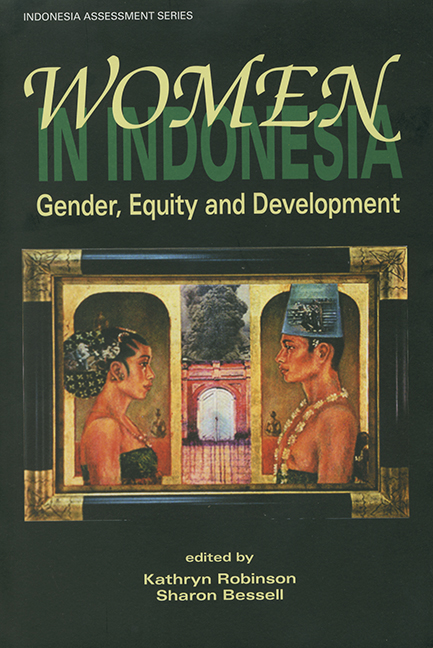Book contents
- Frontmatter
- Contents
- Tables
- Figures
- Contributors
- Acknowledgments
- Glossary
- Prologue
- 1 Introduction to the Issues
- 2 The Mega Factor in Indonesian Politics: A New President or a New Kind of Presidency?
- 3 The Downfall of President Abdurrahman Wahid: A Return to Authoritarianism?
- 4 The Year in Review: From Blind Man's Bluff to Mega Expectations
- 5 Further Comments on the Economy, with a Gender Perspective
- 6 Institution Building: An Effort to Improve Indonesian Women's Role and Status
- Commentary
- 7 Feminism in Indonesia in an International Context
- 8 Gay and Lesbi Subjectivities, National Belonging and the New Indonesia
- 9 And the Winner Is … Indonesian Women in Public Life
- 10 Indonesian Women Artists: Transcending Compliance
- 11 Literature, Mythology and Regime Change: Some Observations on Recent Indonesian Women's Writing
- 12 Women and the Labour Market during and after the Crisis
- 13 Women's International Labour Migration
- 14 Customary Institutions, Syariah Law and the Marginalisation of Indonesian Women
- 15 Women's Grassroots Movements in Indonesia: A Case Study of the PKK and Islamic Women's Organisations
- 16 Women's Activism against Violence in South Sulawesi
- 17 Gender Mainstreaming and Sex-disaggregated Data
- 18 The Changing Indonesian Household
- 19 Women, Family Planning and Decentralisation: New Variations on Old Themes
- 20 Men, Women and Community Development in East Nusa Tenggara
- References
- Index
- INDONESIA ASSESSMENT SERIES
Prologue
Published online by Cambridge University Press: 21 October 2015
- Frontmatter
- Contents
- Tables
- Figures
- Contributors
- Acknowledgments
- Glossary
- Prologue
- 1 Introduction to the Issues
- 2 The Mega Factor in Indonesian Politics: A New President or a New Kind of Presidency?
- 3 The Downfall of President Abdurrahman Wahid: A Return to Authoritarianism?
- 4 The Year in Review: From Blind Man's Bluff to Mega Expectations
- 5 Further Comments on the Economy, with a Gender Perspective
- 6 Institution Building: An Effort to Improve Indonesian Women's Role and Status
- Commentary
- 7 Feminism in Indonesia in an International Context
- 8 Gay and Lesbi Subjectivities, National Belonging and the New Indonesia
- 9 And the Winner Is … Indonesian Women in Public Life
- 10 Indonesian Women Artists: Transcending Compliance
- 11 Literature, Mythology and Regime Change: Some Observations on Recent Indonesian Women's Writing
- 12 Women and the Labour Market during and after the Crisis
- 13 Women's International Labour Migration
- 14 Customary Institutions, Syariah Law and the Marginalisation of Indonesian Women
- 15 Women's Grassroots Movements in Indonesia: A Case Study of the PKK and Islamic Women's Organisations
- 16 Women's Activism against Violence in South Sulawesi
- 17 Gender Mainstreaming and Sex-disaggregated Data
- 18 The Changing Indonesian Household
- 19 Women, Family Planning and Decentralisation: New Variations on Old Themes
- 20 Men, Women and Community Development in East Nusa Tenggara
- References
- Index
- INDONESIA ASSESSMENT SERIES
Summary
The role of Indonesian women in shaping the very fabric of our society is integral to the history of our nation. The struggle by Kartini to promote women's rights in education in the early 1900s and the holding of the first women's congress, Kongres Perempuan, in Yogyakarta on 22 December 1928, as well as many other women's activities in the following decades, have exemplified their contributions in building our society.
In 1952, shortly after independence, Indonesia ratified the UN Convention on Political Rights for Women through Law No. 68/1958. This law gives Indonesian women the right to vote and to be appointed to the legislature. It also assures women's right to assume any position in the government. The general election laws, No. 15/1969, No. 4/1975, No. 29/1980 and No. 3/1985, allow women to participate actively in the political arena and ensure women's right to participate in the decision-making process in Indonesia.
The ratification by the government of Indonesia of the Convention on the Elimination of All Forms of Discrimination against Women (the Women's Convention) by Law No. 7/1984, and of the Optional Protocol to the Convention in 1999, has added to the sanctity of the rights of Indonesian women to share in the development of the nation.
The ratification of these conventions obliges the government to adopt measures to eliminate all forms of discrimination against women. In keeping with both the letter and the spirit of the conventions, the government established a National Commission on Violence against Women on 15 July 1998, on the basis of Presidential Decree No. 181/1998 and with reference to the Women's Convention. The objectives of this commission include promoting public awareness of all forms of violence against women. It is also intended to create a conducive environment for the elimination of violence against women, to defend the human rights of women and to improve preventive measures pertaining to the elimination of violence against women. Its activities are directed towards empowering women and society in general, strengthening the capacity of organisations which defend women against violence, and influencing the government to take the necessary steps to ensure that all forms of violence against women are eliminated. The membership of the commission includes women's rights activists, academics, professionals and religious leaders.
- Type
- Chapter
- Information
- Women in IndonesiaGender, Equity and Development, pp. xxiii - xxvPublisher: ISEAS–Yusof Ishak InstitutePrint publication year: 2002



